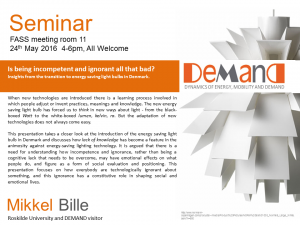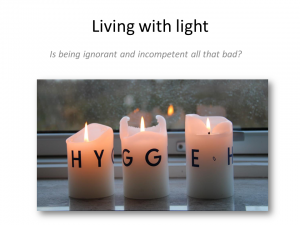 Seminar held: Tuesday 24th May 2016
Seminar held: Tuesday 24th May 2016
When new technologies are introduced there is a learning process involved where people need to adjust or invent practices, meanings and knowledge. For instance, as this presentation discusses, the new energy saving light bulb has forced us to think in new ways about light: From the black-boxed Watt to the white-boxed lumen, kelvin, ra. But such adaptation of new technologies does not always come easy. Research on uses of technology often assume that if people are not competent in using a technology they are at least in the process of becoming so. This presentation takes a closer look at the introduction of the energy saving light bulb in Denmark and discusses how lack of knowledge has become a feature in the animosity against energy-saving lighting technology in Denmark. It is argued that there is a need of understanding how incompetence and ignorance, rather than being a cognitive lack ready to be filled, may both have emotional effects on what people do and be an evaluative term allowing for social positioning. The presentation thus focuses on the fact that everybody are technologically ignorant about something, and this ignorance takes part in shaping social and emotional lives.
Report

Click here to see a copy of the presentation slides
Click here to see a copy of the presentation slides
In a final instalment in sharing his work with us during his visit to DEMAND, Mikkel focused on how to work with ideas of ignorance and incompetence in relation to his interest in light, lighting and atmospheres. He drew on two examples from ethnographic work in Denmark. The first recounted the process of choosing from the array of new bulbs now on the market and how that exposed varying degrees of incompetence in making purchasing decisions; the new bulb types led he argued to lots of ‘failed’ purchases. ‘Buying bulbs is no longer as easy as buying milk and toilet paper’. People had established competencies in making judgements about watts as a unit, but not about lumens, kelvin and similar. The second example was an instance of a set of extravagant xmas lights failing and the commentary and responses that produced. In a street with something like 25000 to 30000 bulbs made into a local xmas spectacle, there was amazing know-how involved in setting up the lights, dealing with fuses and so on. etc.. When this know-how failed it was met with varied emotional reactions to the inability to perform as expected. From these examples Mikkel worked through different forms of technical incompetence and ways of dealing with these, including strategic ways of both claiming or denying incompetence and seeing incompetence as something positive rather than problematic. Discussion centred around exactly what was the aim of the focus here on ignorance and incompetence, and how to work with the two cases in the context of the wider and related arguments of other parts of the book that Mikkel has been writing. We also pondered how gender was part of the two cases, how learning and incompetence are related, and how embodiment was to be understood.

